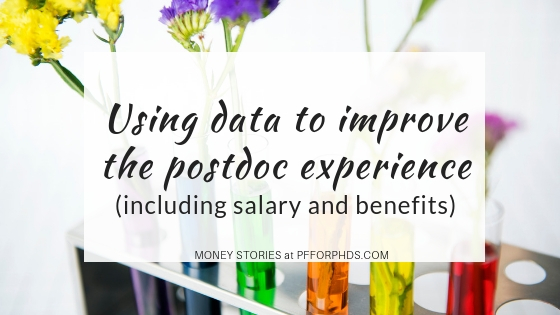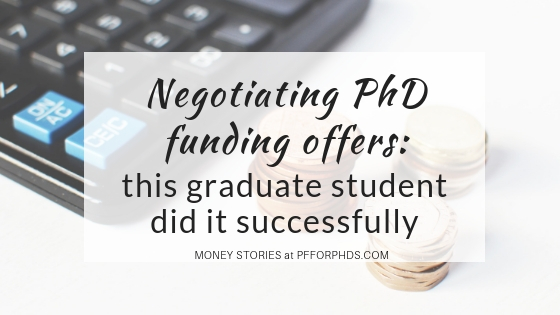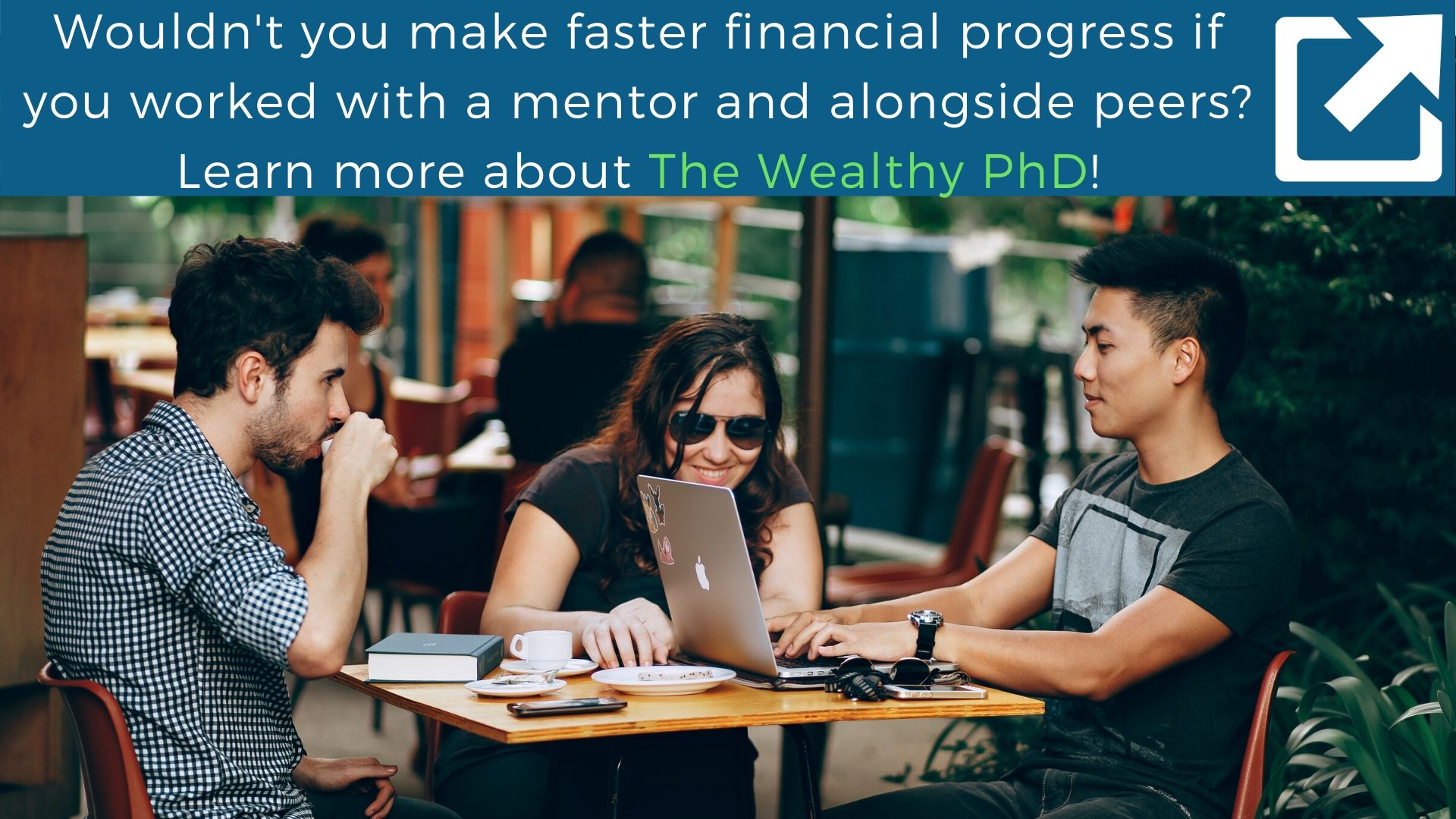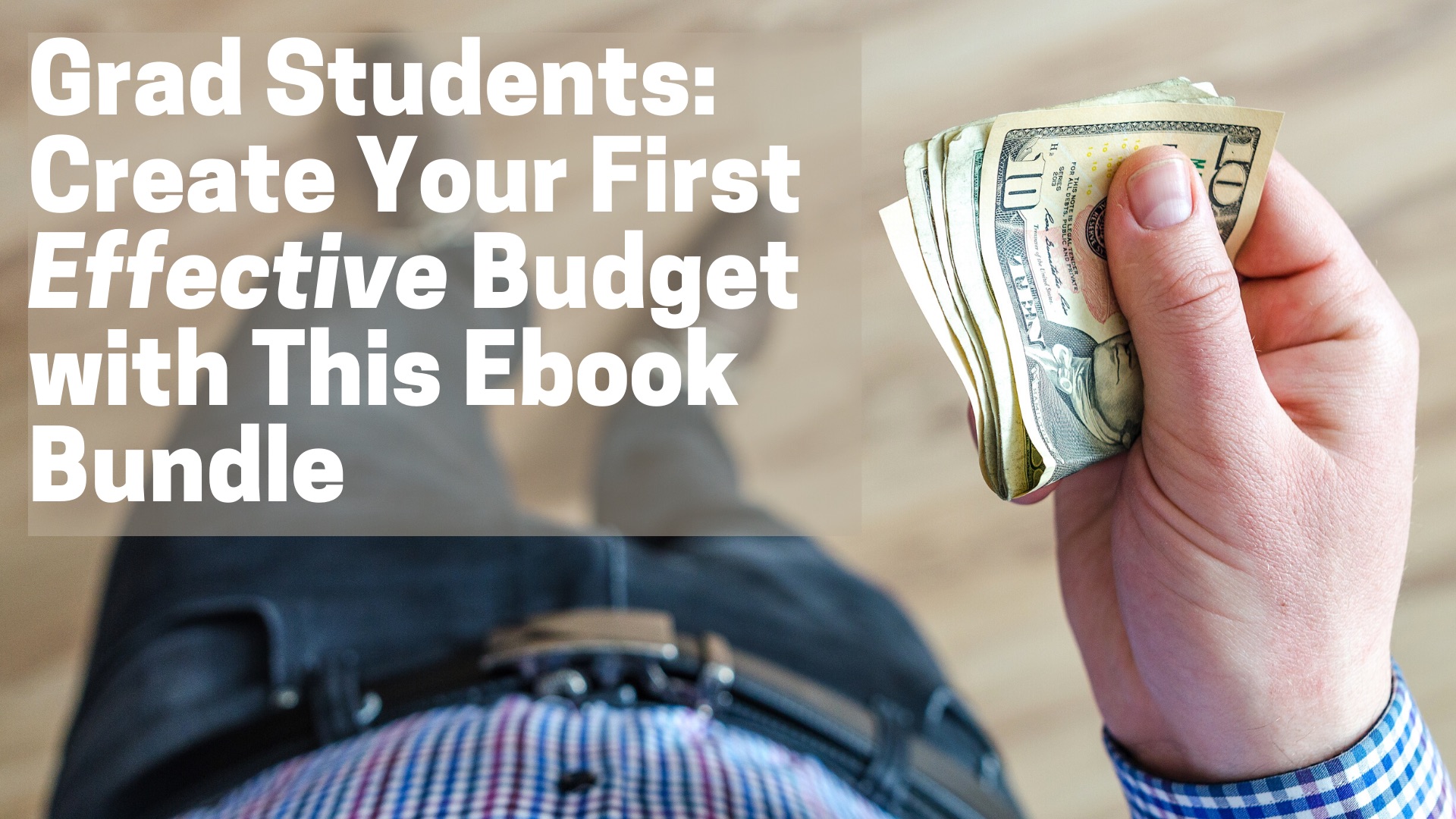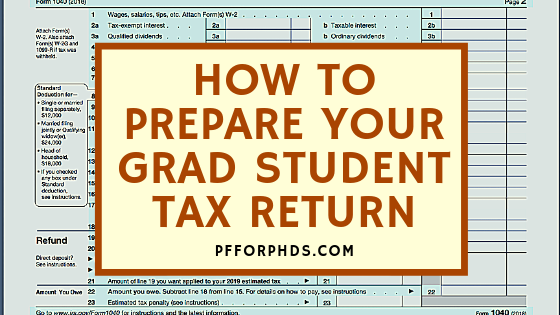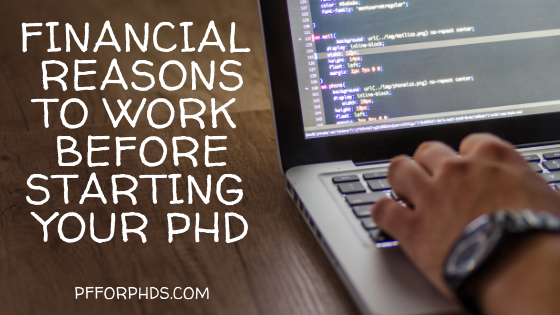“Actually, I get paid to go to school.” How many times have you said that to distant relatives and new acquaintances? If you look at it that way, being a funded grad student is a pretty sweet gig. But there are definitely downsides, like the low pay, sub-par benefits, and the weird tax situations that come with getting paid to be a grad student in the US. Receiving a 1098-T that has seemingly no basis in reality and having to incorporate it into your tax return—or worse, not receiving one—can become a real time- and energy-suck. The whole tax return support system seems to have been set up to help people who are in the red with their universities, not people who are in the black. Fortunately, there are solutions to these weird tax situations for fully funded grad students, and I’ve brought them to light for you in this point.

The points covered in this post are strictly to do with being a funded graduate student (“candidate for a degree”) at a US university. It is primarily written for graduate students who are US citizens, permanent residents, and residents for tax purposes.
This article was most recently updated on 12/18/2025. It is not tax, financial, or legal advice.
Further reading:
You Might or Might Not Receive a 1098-T
Form 1098-T looks like a super official tax form, rather like Form W-2. However, it’s not as weighty of a form as other tax forms you might receive for the purpose of reporting income. Form 1098-T’s primary purpose is to let the IRS know that a student (or a student’s parents) might try to take a higher education tax credit so that it can check the amount of the tax break claimed; it’s not designed and is not well-suited for reporting income, which is primarily what funded graduate students need to do. In fact, it’s optional for universities to even generate a Form 1098-T for a student for whom the Form 1098-T’s Box 5 (“Scholarships or grants”) would be greater than Box 1 (“Payments received for qualified tuition and related expenses”), which is often the case for funded graduate students. So as a fully funded graduate student, you might receive a 1098-T or you might not; the choice belongs to your university.
Further reading: What Is a 1098-T?
Your 1098-T Might Mislead You
The only thing worse than not receiving a 1098-T is receiving one that is misleading.
Further reading: Form 1098-T: Still Causing Trouble for Funded Graduate Students
When a 1098-T is issued, it is supposed to contain all of the scholarships and grants that were processed through the graduate student’s account (Box 5) as well as the payments received (Box 1) for qualified tuition and related expenses. In addition, your fellowship stipend might appear in Box 5 (or it might not). You would think this would be straightforward bookkeeping, yet I’ve spoken with numerous graduate students who, even after careful study of the transactions in their student accounts, could not understand how the sums were calculated.
Even if your Form 1098-T is a straightforward representation of the transactions in your student account, the net fellowship/scholarship income you should report on your tax return is not necessarily Box 5 minus Box 1. More on that next!

You Have to Calculate Your Taxable Awarded Income
It’s really straightforward to report your Form W-2 income, which I call “employee income,” on your tax return. The number is right there in Box 1, and it goes into Form 1040 Line 1a.
However, you have to calculate the taxable portion of your fellowship/scholarship/grant income, which I call “awarded income,” before reporting it on your tax return.
This is because, as a student (“candidate for a degree”), you’re eligible for a higher education tax break called tax-free scholarships and fellowships, which is detailed in Publication 970 Chapter 1. This means that the awarded income that you receive is taxable only to the extent that it exceeds your “qualified education expenses.”
To calculate your taxable awarded income, you need to add up all of your awarded income and then subtract all of your qualified education expenses. (This is not the same calculation as subtracting your Form 1098-T Box 1 from your Form 1098-T Box 5—more on that next!) Sometimes, this will net out to zero, like if the scholarship for your tuition exactly pays the amount of your tuition. Sometimes, there will be excess income or excess qualified education expenses.
In fact, funded graduate students often overpay their true tax liability because they miss accounting for some of their qualified education expenses! This could happen because they forgot about an education expense they paid for out of pocket or because they misunderstood that a charge in their student account actually was a qualified education expenses under this benefit.
Further reading: Where to Report Your PhD Trainee Income on Your Tax Return
You Have to Figure Out Your Own Qualified Education Expenses
To expand on that point, there is a lot of well-deserved confusion over what a “qualified education expense” actually is. This is because the definition of a Qualified Education Expense is slightly different depending on the tax break you’re trying to take. Yeah, that’s another weird tax situation for fully funded grad students.
IRS Publication 970 Introduction:
“Even though the same term, such as qualified education expenses, is used to label a basic component of many of the education benefits, the same expenses aren’t necessarily allowed for each benefit.”
Tuition is considered a qualified education expense for tax-free scholarships and fellowships and the two higher education tax credits, but some additional expenses, such as required fees and course-related expenses, e.g., books and supplies, are included in the definition for tax-free scholarships and fellowships. Even a personal computer could be considered a qualified education expense for tax-free scholarships and fellowships under very well-defined circumstances. These types of expenses are unlikely to appear on your 1098-T in Box 1 because they’re usually paid out of pocket. You should refer to Publication 970 for the full definitions of qualified education expenses under the three different education benefits.
Furthermore, the number that appears in Box 1 of your Form 1098-T is not the sum of your qualified education expenses that are processed by your student account. Box 1 of Form 1098-T reflects “qualified tuition and related expenses,” which has its own definition that excludes certain expenses that are qualified education expenses under tax-free scholarships and fellowships.
Further reading: What Are Qualified Education Expenses?
One controversial point is whether your student health insurance premium is a required fee/qualified education expense for the purpose of making the scholarship that pays it tax-free. Insurance and student health fees, along with some other expenses, are explicitly disallowed as qualified education expenses for the Lifetime Learning Credit, but not for making scholarships tax-free.
My tax return preparation workshop contains a complete discussion of qualified education expenses, including common gray-area examples that graduate students encounter, and how to calculate the taxable portion of your awarded income.

You Might or Might Not Be a Dependent of Your Parents
Because graduate students are students, they might be considered dependents of their parents (or another relative) for tax purposes if they were under age 24 on 12/31. Many parents (and their tax preparers) try to claim their of-age children as dependents without referencing the relevant definitions. If your parents assume you are a dependent but you believe you are not, together you can go through the definition carefully to make the final determination.
The conditions for being considered a dependent of your parent are:
- You are age 23 or younger at the end of the calendar year.
- You were enrolled as a student in at least 5 calendar months (doesn’t have to be consecutive).
- You lived with your parents for at least half the year (being away for educational reasons can count as living with them).
- You are not filing a joint return (with a caveat).
- You must meet the “Support Test”: You did not provide more than half of your own support in the calendar year (see Publication 17 Worksheet 3-1).
For any years that the first three points above apply to you, you should fill out the Support Test to determine if you provided enough of your own support to qualify as independent. Keep in mind that education expenses count as “support” that you needed, but scholarships and fellowships that paid that support don’t count as being provided by you, the student.
You’re (Mostly) Not Paying FICA Tax
FICA (Social Security and Medicare) taxes seem like an unavoidable burden for employees and self-employed people. But even if you’re an employee of your university (i.e., you receive a W-2 at tax time), you’re most likely not paying FICA tax because you have a student exemption. This exemption depends on both the primary function of the organization that employs you (i.e., educational) and your primary relationship with the organization (i.e., as a student rather than an employee).
The student exemption is almost universal for graduate students, but I have come across two exceptions that depend heavily on the exact wording of the exemption:
1) Graduate students at research institutions that are not primarily universities might not receive the exemption.
2) Graduate students, even at universities, whose primary relationship with their employer is as an employee rather than a student may pay FICA tax. For example, this might occur during the summer vs. during the academic year, and could happen without the student even perceiving a difference in roles. (This is not common, but I have seen it a few times.)
Graduate students receiving fellowships also do not pay FICA tax, but that is because they are not receiving wages rather than due to their student status.
You Cannot Take the Saver’s Credit
The Saver’s Credit is a very valuable credit that low-income earners can take if they contribute to a retirement account, such as an IRA. However, full-time students are not eligible for the credit.
Yes, there are a lot of weird tax situations for fully funded grad students. You have to do a bit of legwork instead of just blindly entering numbers from your 1098-T into tax software or ignoring your excess scholarship income. But if you break the issues down one by one, it’s actually straightforward to determine how to resolve them.



